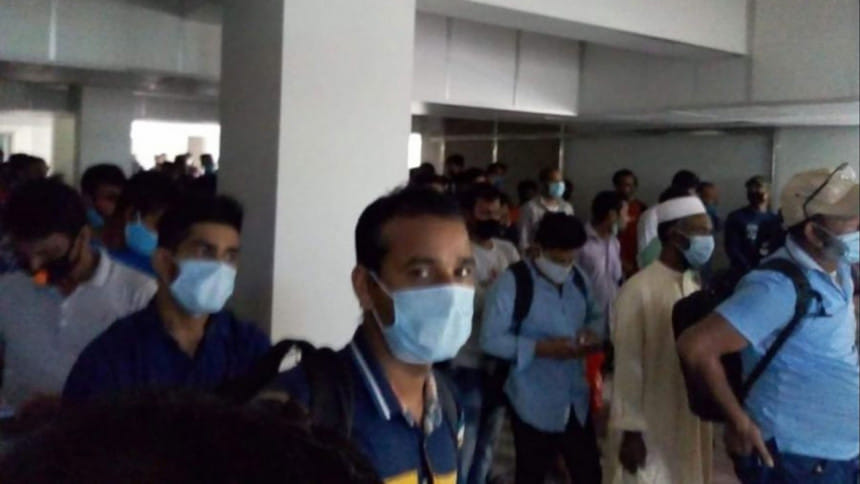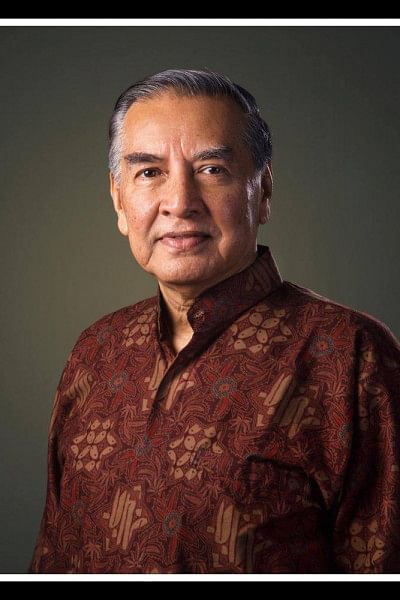Injustice, so what?

The September 2 issue of The Daily Star had two contrasting stories that dramatically expose our hypocritical attitudes towards our expatriate workers. On the one hand, we are so eager to lay our hands on their hard-earned foreign exchange—which we recklessly waste or allow scamsters to syphon away for their second, third or umpteenth home (or shall we call them villas or palaces?) in Canada, Malaysia, Dubai, or wherever.

But when it comes to helping our workers who are exploited, cheated, beaten, tortured, thrown out of jobs, or never given the job that was promised or at the level of pay promised, we turn our face away as if they don't exist and we even have the temerity to jail them when they—after indescribable hardship—manage to return home. On what grounds? "They have tarnished the image of the country." The realm of the absurd appears to have no bounds when it comes to official justification to incarcerate ordinary and poor citizens. The case of expatriate workers is especially ironic because we so greedily seek the money they send home.
Of the two contrasting stories, the first entails praising them for sending 36 percent higher remittance this August compared to last year, belying dire predictions of economists. It was the third straight month of growth. It marked a 50 percent growth year-on year for the July-August period amounting to USD 4.56 billion. The remittance continued to grow despite falling employment, much to the credit of our workers whose love for their families and the country makes them undertake perilous journeys, suffer immense indignity, and perform unbelievable hours of hard labour so that we are better off.
The second story deals with 81 migrant workers being thrown into jail on Tuesday after a court order following the expiry of their 14-day mandatory quarantine. In arguing for their internment, a sub-inspector (SI) of Turag Police Station reasoned, "Their criminal activities have tarnished the country's image and also put a negative impact on the labour industry." If these workers were released, they could engage in various crimes including robbery, family violence, killing and militancy, the SI argued. Are we to understand that they trained to became militants in Vietnam? Wow, ISIS has really spread. May be we are doing the Vietnamese government a great favour by letting them know something they are still to find out.
The police want them in jail till the "probe" is complete. The magistrate sent them to prison without specifying how long they would have to be there. If we follow the process of the probe, it will most likely consist of letters from the police being sent to the home ministry, which will forward it to the foreign ministry, then forward it to our embassy in Hanoi, which will contact the local police, who, having no reason or motivation to investigate the allegations anew, will send back the same official complaints that they lodged before, which will then follow the same serpentine route and find its way back to Turag Thana, which will then submit the "proof" of their crimes and seek conviction, all the while these "tarnishers" of country's image will rot in jail unless… and here, the possibilities are endless depending on the resource base of the workers, for whose hard-earned green bucks we send them all over the world.
When asked why the Vietnam returnees were in jail, the expatriates' welfare minister told The Daily Star, "Ask the Home ministry, they arrested them; we did not." A correct answer, but not an empathetic one. It may fit a bureaucrat but not a people's representative which the minister is supposed to be. After all, he is the one heading the expatriates' welfare ministry. Where is the "welfare" for the expatriate workers in this case?
The story from the side of the workers is totally different—one that the government is apparently not interested in learning about or investigating. Towards the end of last year and early this year, manpower agents offered these job-seekers employment opportunities in Vietnam for a salary ranging from USD 500-600. It was all official and seemed above board.
The plot thickens as we examine the role of the Bureau of Manpower, Employment and Training (BMET), the government body authorised to check, do due diligence, and give official "clearance" before workers are permitted to go abroad. The BMET is meant to prevent workers from going abroad on "fake jobs". In case of the hundred-plus workers proceeding to Vietnam, the official clearance for all of them was duly issued by BMET. The agents were paid Tk 4-5 lakhs by each of them for these jobs that BMET gave clearances for.
While travelling, each of these workers were asked to carry on their person USD 1,000 to USD 5,000 to be handed to the agents' representatives in Vietnam. This amounted to money laundering as these transfers were completely unauthorised. On arrival, their passports and of course the money were seized, and they were sent to various factories without any work permit. What happened then was what usually happens to all helpless, paperless and passport-less people in any foreign land. They are exploited to the hilt, made to work as slaves, mercilessly beaten under any pretext, whimsically fed or not fed, and treated without minimum pay or human dignity.
The story gets chilling when we hear that fellow Bangladeshis are as much a part of this inhuman chain of exploiters as the Vietnamese. These "wretched of the earth" went to local police who, as can be expected, did not extend any help. These fellow Bangladeshi workers, on whose "earnings" so much of our development depends, then found their way from various parts of Vietnam to Hanoi and sought help from our embassy there.
Our Ambassador in Vietnam, Samina Naz, speaking to this newspaper, said that she wrote several times over the last two years to our home and expatriates' welfare ministries, informing them of the rise of gangs that exploit our workers and have been carrying on this nefarious trade in human trafficking for some time. She did not receive any reply to her letters, not even an acknowledgement.
Given the above reality and the inhuman sufferings already endured by our fellow citizens, to jail them for "tarnishing the image of the country" and "harming our overseas labour market" can only be termed as the height of hypocrisy, corruption and exploitation of our expatriate labour class. As we have shown earlier, after having been robbed of their possessions, freedom and human dignity abroad, they will now rot in our jail till the "probe" is complete.
As for "tarnishing the image of our country" and "negatively impacting our labour market"—who are responsible, really? The victims of exploitation, or their perpetrators and the officials who are making such exploitation possible? How can the BMET shrug off its responsibility? If the home and expatriates' welfare ministries listened to our ambassador in Hanoi, much suffering and "tarnishing" could have been avoided.
Due to reporting in this newspaper and others, the concerned minister did set up an "enquiry committee" last July. Obviously, its works have not finished yet. The minister has already said that he does not want to be harsh on the agents because they have been adversely affected by the pandemic. I suppose he will also not want to be harsh on BMET officials who gave those official clearances, after all they are serving the country by sending workers abroad whether their jobs are real of fake. As for the real earners of the foreign exchange—the workers—who cares if they rot in jail?
Mahfuz Anam is Editor and Publisher, The Daily Star.

 For all latest news, follow The Daily Star's Google News channel.
For all latest news, follow The Daily Star's Google News channel. 



Comments